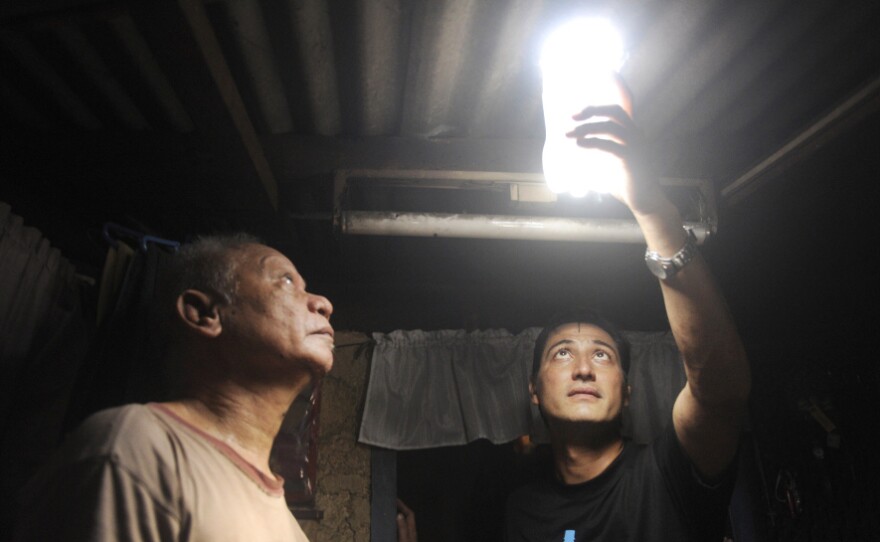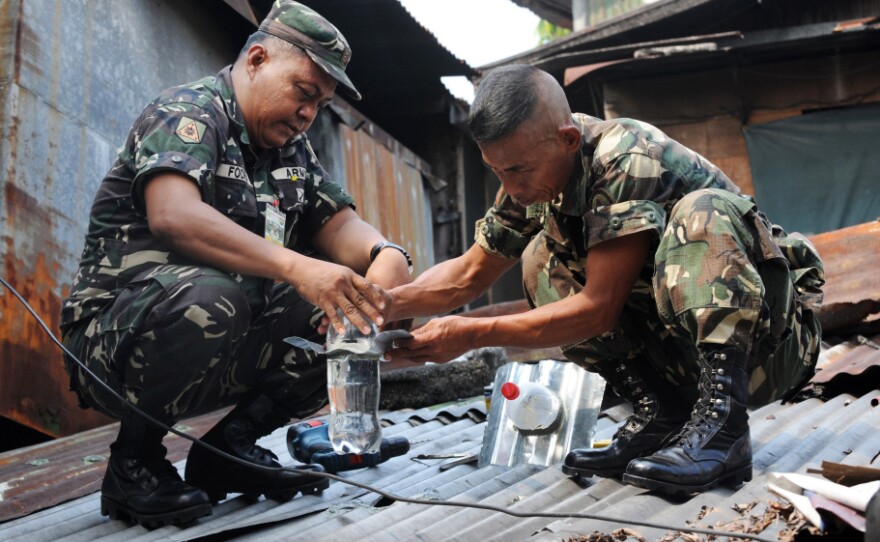Sheila Royeras, her husband, her mother and two young daughters live in a single-room cement apartment in a poor neighborhood in Manila, Philippines. Like many such homes, it's mostly dark during the day, except for a small ray of sunlight that enters through an open front door.

But this is about to change.
On this morning, volunteers and local government workers arrive to hang low-tech solar light bulbs from the corrugated metal roof. The bulbs are very simple, very effective and the ambitious plan is to put them in 1 million homes this year.
The bulbs are actually discarded plastic soda bottles filled with water and wedged in a hole cut in the roof. With the help of a tropical sun, the makeshift bulbs give off about 55 watts of light. There is no electricity involved.
As a result, electricity bills are slashed in a poor country where nearly half the population lives on less than $2 a day.
While the workers install the light bulbs in her home, Royeras looks forward to keeping the electric lights off during the day.
"Because of [the high price of] electricity sometimes we don't eat," she says. "If we don't pay that bill on time, electricity is cut."
Royeras says having electricity is a priority because her sixth-grader needs light to study and keep up her honor-roll status.
A Simple Bulb
The holes in the roof are cut to the size of a one-liter plastic soda bottle. The workers fill the bottle with purified water and two caps of bleach that prevent the growth of mold. The bottle is held in place by a small metal brace.
It's safer. It's healthier. It's brighter. And the funny thing is, the light bulb actually comes from the place you'd least expect it, which is the trash bin. So it's the cheapest light bulb in the world.
Nelly Duka, a community leader who helps assemble the bulbs, says they have a five-year lifespan.
Volunteers push the bottle through the hole in the roof until it juts in halfway. They hammer the brace to keep it in place. Then, workers use sealant to guard against leaks from rain. The sun's light passes through the top of bottle and the water inside refracts it, casting a glow from the bottom.
In a neighboring municipality, Illac Diaz keeps tabs on a solar bulb-making program at a local jail. Diaz heads the nonprofit MyShelter Foundation, which is overseeing this lighting project called "A Liter of Light."
He says in tropical countries poor people often live in dark spaces that are heavily covered against driving rains and the hot sun. Diaz says this type of bulb is a better alternative to candles or other potential fire hazards.
"It's safer. It's healthier. It's brighter. And the funny thing is the light bulb actually comes from the place you'd least expect it, which is the trash bin," Diaz says. "So it's the cheapest light bulb in the world."
Diaz estimates the solar bulbs will save customers an average of $10 a month on their electric bills.
For Royeras, having the three new bulbs in her tiny house is a huge benefit.
"I'm much happier," she says. "Maybe by the time we get the next electric bill, I'll have some extra money to buy food."
Copyright 2022 NPR. To see more, visit https://www.npr.org. 9(MDAzMjM2NDYzMDEyMzc1Njk5NjAxNzY3OQ001))






